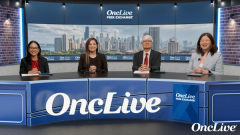
Opinion|Videos|July 23, 2024
DELLphi-301: Platinum Chemotherapy Efficacy in SCLC Survival
In a detailed analysis, key opinion leaders (KOLs) review the results of the DELLphi-301 Phase 2 clinical trial, assessing the efficacy of platinum-based chemotherapy in the treatment of small cell lung cancer (SCLC) and its impact on overall survival outcomes for patients enrolled in the study.
Advertisement
Episodes in this series

Video content above is prompted by the following questions:
- DELLphi-301 Phase 2 Clinical Trial of Tarlatamab
- Please share your insights on the importance of ORR and DoR in patients with ES-SCLC who have relapsed or who are refractory to platinum-based chemotherapy.
- At the community practice level, does 90 days continue to mark platinum sensitivity status among patients with ES SCLC?
- What other factors contribute to the definition of treatment resistance in this patient subgroup?
- How clinically meaningful is a median OS of 14 months and a DoR of between 6 and 9 months in patients with relapsed or refractory ES SCLC?
- How do you weigh the risk-benefit ratio of treatment with tarlatamab in relapsed or refractory ES SCLC?
- To what degree might a Black Box warning on risk of CRS and ICANS impact ready adoption of this new therapy by community oncologists for their patients with progressive ES SCLC?
- Given that no fatal CRS or ICANS events were reported with the 10 mg dose and only one dose interruption was reported in Part 1 and 2 of the published Phase II study report, what is the potential to reduce patient monitoring time between bimonthly infusions of tarlatamab?
Advertisement
Latest CME
Advertisement
Advertisement
Trending on OncLive
1
Long-Term Cilta-Cel Data Show Low Rates of PFS Events in Standard-Risk R/R Myeloma
2
Nonresponse to Bridging Therapy and Peak ALC After Cilta-Cel Are Associated With Neurotoxicity, NRM in Myeloma
3
FDA Updates Axi-Cel Label to Remove Limitation of Use in R/R PCNSL
4
Real-World Data Support Clinical Benefit With Lifileucel in Previously Treated Advanced Melanoma
5





































